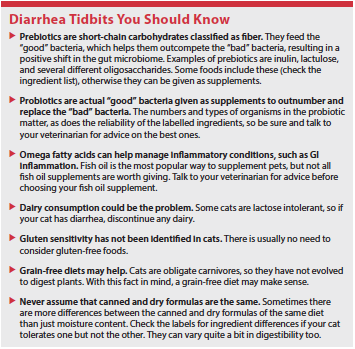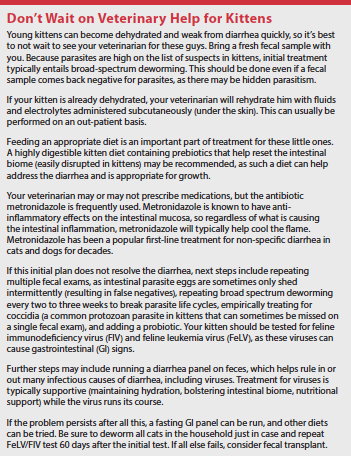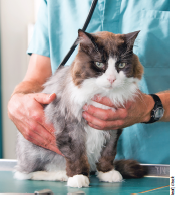“My cat has diarrhea.” Sounds simple, right? It’s not. With many different causes for diarrhea, it can be a painful process to get to a definitive diagnosis, treatment, and resolution. The first step is careful, thoughtful answers to all the questions your veterinarian asks you. You will be doing your part to help point the diagnostic process in the right direction.
Most often, diarrhea occurs when something interferes with the intestinal lining’s ability to reabsorb water, one of its critical functions. This is typically the result of intestinal inflammation, caused by one or more of the primary diseases known to cause diarrhea in cats. An exception to this “rule” is exocrine pancreatic insufficiency (EPI), which causes diarrhea due to maldigestion of nutrients, rather than intestinal inflammation. Intestinal inflammation alters intestinal mucosal absorption, secretions, permeability, and motility. The result is diarrhea.
“The timing and duration of the diarrhea will dictate how involved of a workup will be needed to determine the underlying etiology (cause),” says Stephanie Maria Smith, DVM, resident in internal medicine at the Cornell University Hospital for Animals. “In acute cases, often minimal diagnostics are necessary, especially if appetite, energy levels, and weight are stable. Therapy is typically targeted toward supportive care. Once the history of diarrhea becomes chronic, a much more involved workup will be necessary.”

Diarrhea can be caused by inflammation, infection, disease, parasites, obstructions, stress, a random diet change, or another short-lived occurrence. To expediate diagnosis, be prepared to answer these questions when you bring your cat to the veterinarian:
Nutrition: What is your cat eating? Have there been any recent diet changes?
Lifestyle/environment: Is your cat an indoors-only citizen? Going outside opens the door (pun intended) to parasites, infectious disease, dietary indiscretion, and toxins. These are all less likely causes in cats kept indoors.
Acute vs. chronic: Did it start recently and suddenly (acute) or has it been going on for a while (chronic)? This impacts prognosis and prospects for a quick solution.
Nature of feces: Is it voluminous amounts of watery diarrhea (small bowel signs) or more frequent passing of smaller amounts of soft stool with mucous or blood (large bowel signs)? This information also helps direct the diagnostic process.
Physical symptoms: Have you noticed other changes? Small-bowel diarrhea is associated with decreased appetite, weight loss, gurgling stomach noises, abdominal discomfort, and failure to thrive (not gaining or maintaining weight as expected). Large-bowel diarrhea is associated with straining, defecation discomfort, and urge incontinence.
with decreased appetite, weight loss, gurgling stomach noises, abdominal discomfort, and failure to thrive (not gaining or maintaining weight as expected). Large-bowel diarrhea is associated with straining, defecation discomfort, and urge incontinence.
Treatment Options for Adult Cats
Compared to kittens (see sidebar on p 6), adult cats are more likely to have inflammatory, dietary, metabolic, or neoplastic (tumor-forming) disease underlying their diarrhea. The physical exam, fecal exam for parasites, and a course of metronidazole are still the usual first steps, but you’ll move pretty quickly into bloodwork, imaging, and a GI panel with these guys. If everything is normal and/or any abnormalities found have been corrected and the problem persists, it’s time for a diet trial.
Diet Trials
A diet trial normally involves one of three different approaches:
Highly digestible. These are usually low in fat, low in fiber, manufactured with heating/processing methods known to maximize ease of nutrient absorption. Hill’s I/D and Royal Canin Gastrointestinal are two examples.
High fiber. These are usually low in fat, high in fiber and work better for large bowel diarrhea. Examples include Hill’s W/D and Royal Canin Gastrointestinal Fiber Response.
Limited ingredient (LID) or hydrolyzed protein (HP). These types of diets are considered hypoallergenic so are used to rule out food allergy as an underlying cause of the diarrhea.
LIDs should have one protein source, which is hopefully something “novel,” which means your cat’s GI tract has never been exposed to it before (e.g., rabbit, duck, kangaroo), and one carbohydrate source (e.g., rice, barley, potato, pea). Everything else on the ingredient list should look like vitamins and minerals. Hill’s and Royal Canin offer several varieties. Natural Balance is non-prescription and has several choices.
HP diets are prescription diets you get through your veterinarian. It is thought that the large size of protein particles is what sets off the immune response in a food allergy. Most HP diets are chicken-based, but the chicken protein is processed to reduce the size of the naturally large protein particle into smaller amino acid sequences not recognized by the body as foreign.
Diet trials for food allergy resulting in GI distress only need to be carried out for two weeks to get your answer. (For skin allergy, diet trials should be carried out for at least eight weeks.) If the first one you choose works, stick with it. If not, try another. It could take a few tries to hit on the right diet, so be patient. It will be worth it in the end if your cat can be healthy and comfortable just by eating the right food.
Next On the List
If you’ve done all of this and your cat still has diarrhea, it’s time to consider intestinal biopsies to rule out inflammatory bowel disease (IBD) and cancer. IBD may require steroid/immunosuppressive therapy. Some cancers can be treated, but many carry a guarded-to-poor prognosis. At this point, consultation with an internal medicine specialist, board-certified veterinary surgeon, and/or veterinary oncologist is usually recommended.
A fecal transplant is usually a last-resort option for chronic, non-responsive diarrhea. Its purpose is to reset the intestinal microbiome with normal GI flora by using a specially chosen and screened donor cat to obtain the feces from. This procedure is best performed by a specialist and not done frequently. There is little published data regarding its efficacy, but anecdotal reports of success exist.
Bottom Line
If diarrhea resolves on its own within a day or two, your cat is likely OK (except with kittens, for which you should seek help immediately). You can try diet changes and feeding prebiotics/probiotics before heading to the veterinarian. Sometimes Mother Nature, with a tincture of time, will heal these short-term upsets.
Don’t let it go on too long, though. Two weeks is chronic, and at this point diarrhea is unlikely to get better on its own. Long-term, unresolved intestinal inflammation has devastating effects on your cat’s health and may even become irreversible. Don’t let this happen. Let your veterinarian help you help your cat get back to good health.



